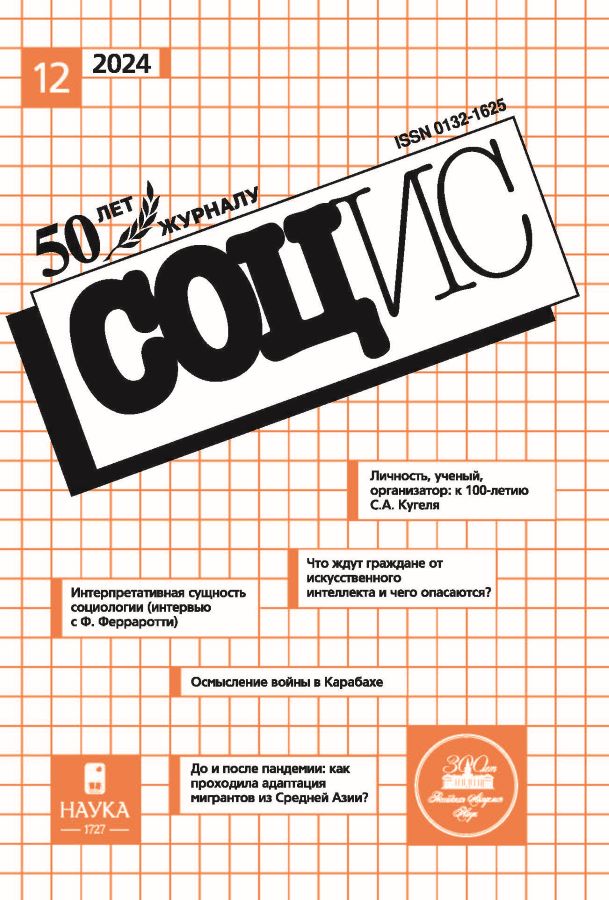The future is not only in the present but also in the past: once again about the subject of ethnosociology
- 作者: Popkov Y.V.1
-
隶属关系:
- Institute of Philosophy and Law SB RAS
- 期: 编号 12 (2024)
- 页面: 126-137
- 栏目: ANNYVERSARY
- URL: https://ruspoj.com/0132-1625/article/view/683580
- DOI: https://doi.org/10.31857/S0132162524120117
- ID: 683580
如何引用文章
详细
The author defends the idea of an important role of domestic ethnology research traditions in preserving and developing ethnosociology as an independent scientific direction. Author builds on the conclusions of his previous article [Popkov, 2024], in which he presented a crisis diagnosis on the state of affairs in ethnosociology and the threat to it in connection with the anthropological revolution in domestic ethnological science. The definition of the strategic ethnosociology prospects is linked to the solution of a fundamental problem for it – of defining its special subject-problem field. In this context, the author develops some provisions of the ethnosociology founders and the achievements of the Novosibirsk ethnosociological school. On this basis, he substantiates an understanding of ethnosocial processes as a complex, generalized subject of ethnosociology. He argues that these processes themselves are a stable-dynamic system of reflexive interaction and development of ethnosocial subjects as a unity of stability and variability, dialectics of the objective and subjective, material and spiritual, real and virtual, taking into account the identification strategies of subjects and the impact of network structures. Such presentation allows to highlight specificity of ethnosociology in relation not only to anthropology, but also to a number of other disciplines about peoples.
全文:
作者简介
Yuri Popkov
Institute of Philosophy and Law SB RAS
编辑信件的主要联系方式.
Email: yuripopkov54@mail.ru
Dr. Sci. (Philos.), Prof., Chief Researcher
俄罗斯联邦, Novosibirsk参考
- Alymov S. S., Perepelkin L. S. e. a. (2022) Post-mortem Ethnos: Reflections and Comments. E`tnograficheskoe obozrenie [Ethnographic Review]. No. 6: 102–131. doi: 10.31857/S0869541522060070. (In Russ.)
- Arutunyan Yu.V., Drobizheva L. M., Susokolov A. A. (1998) Ethnosociology: a textbook for universities. Moscow: Aspect Press. (In Russ.)
- Bromley Yu.V. (1987) Ethnosocial Processes: Theory, History, Modernity. Moscow: Nauka. (In Russ.)
- Drobizheva L. M. (2005) Ethnosociology Today. Problems of Methodology of Interdisciplinary Research. In: Interdisciplinary Research in the Context of Socio-Cultural Anthropology: Coll. in honor of Yurik Vartanovich Arutyunyan. Ed. by M. N. Guboglo. Moscow: Nauka: 14–25. (In Russ.)
- Drobizheva L. M. (2016) In Memory of Yurik Vartanovich Arutyunyan. In: Ethnosociology Yesterday and Today. Ed. and comp. by L. V. Ostapenko, I. A. Subbotina. Moscow: IEA RAN: 13–15. (In Russ.)
- Ethnosocial Processes and Ethnonational Politics in the Regions of Siberia (2015). Еd. by Yu. V. Popkov. Novosibirsk: Publishing House SB RAS. (In Russ.)
- Ethnosocial Processes in Siberia: Thematic Collection (1997–2015). Ed. by Yu. V. Popkov. Issues 1–10. Novosibirsk. (URL: https://www.philosophy.nsc.ru/books/eps). (In Russ.)
- Guboglo M. N. (2016) Ethnosociology: Soviet Roots and Post-Soviet Crown. In: Ethnosociology yesterday and today. Ed. and comp. L. V. Ostapenko, I. A. Subbotina. Moscow: IEA RAN: 454–469. (In Russ.)
- Okladnikov A. P. (1973) Ethnogenesis and Cultural Genesis. In: Problems of ethnogenesis of the peoples of Siberia and the Far East. Ed. dy A. P. Derevyanko. Novosibirsk: [b. i.]: 5–11. (In Russ.)
- Popkov Yu. (2023а) Ethnocultural Neotraditionalism: Reflexive Integration Theoretical Model. Etnografia [Ethnography]. 3 (21): 203–223. doi: 10.31250/2618-8600-2023-3(21)-203-223. (In Russ.)
- Popkov Yu.V. (2022) Novosibirsk Scientific Ethnosociological School: Formation, Conceptual Foundations, Practical Applications, Interaction with the Founders of Ethnosociology. In: Ethnosociology: searches and achievements / Ed. ed., compiled by: L. V. Ostapenko, I. A. Subbotina. Moscow: IEA RAS: 40–48. (In Russ.)
- Popkov Yu.V. (2023b) Ethnosocial Processes in the Conceptual Sphere of the Novosibirsk Scientific Ethnosociological School. Gumanitarny`e nauki v Sibiri [Humanities in Siberia]. Vol. 30. No. 2: 14–23. doi: 10.15372/HSS20230202. (In Russ.)
- Popkov Yu.V. (2024) Anthropological Revolution and Challenges for Ethnosociology (Invitation to Discussion). Sociologicheskie issledovaniya [Sociological Studies]. No. 9: 43–55. doi: 10.31857/S0132162524090047. (In Russ.)
- Popkov Yu.V., Tyugashev E. A. (2009) Ethnosociology: a Conceptualization. Sociologicheskie issledovaniya [Sociological Studies]. No. 3: 93–101. (In Russ.)
- Popkov Yu.V., Kostyuk V. G., Persidskaya O. A. (2022) Novosibirsk scientific ethnosociological school. Novosibirsk: IFPR SO RAN. (In Russ.)
- Sociocultural Monitoring of the Urban Interethnic Community: Methodology, Methods, Practice (2018). Ed. by Yu. V. Popkov. Novosibirsk: Publishing house of NSTU. (In Russ.)
- Tishkov V. A. (2003) Requiem for an Ethnos: Studies in Socio-Cultural Anthropology. Moscow: Nauka. (In Russ.)
- Tishkov V. A. (2020) Where Russian Ethnology Came From and Where It Came From: A Personal View in a Global Perspective. Etnograficheskoe obozrenie [Ethnographic Review]. No. 2: 72–137. (In Russ.)
- Verkhovtsev D. V. (2022) Post-mortem Ethnos: Soviet Theories of Ethnos in Contemporary Russian-Language Discourse. E`tnograficheskoe obozrenie [Ethnographic Review]. No. 6: 79–101. doi: 10.31857/S0869541522060069. (In Russ.)
- Wiener B. E., Divisenko K. S. (2015) Russian Ethnosociology: Boundaries, Research Areas and Research Groups. Sociologiya nauki i texnologij [Sociology of Science and Technology]. Vol. 6. No. 4: 177–196. (In Russ.)
- Winer B. E. (2022) Contradictions of the Soviet Theory of Ethnos: History of the Concept and Its Prospects. Izvestiya Irkutskogo gosudarstvennogo universiteta. Seriya Geoarxeologiya. E`tnologiya. Antropologiya [Bulletin of Irkutsk State University. Series Geoarchaeology. Ethnology. Anthropology]. Vol. 40: 37–51. doi: 10.26516/2227-2380.2022.40.37. (In Russ.)
- Winer B. E. (2023) The Most Important Elements of the Soviet Theory of Ethnos: Prospects for Use in Modern Theories of Ethnicity. Izvestiya Irkutskogo gosudarstvennogo universiteta. Seriya: Geoarxeologiya. E`tnologiya. Antropologiya. [Bulletin of Irkutsk State University. Series: Geoarchaeology. Ethnology. Anthropology]. 2023. Vol. 45: 77–92. doi: 10.26516/2227-2380.2023.45.77. (In Russ.)
补充文件









